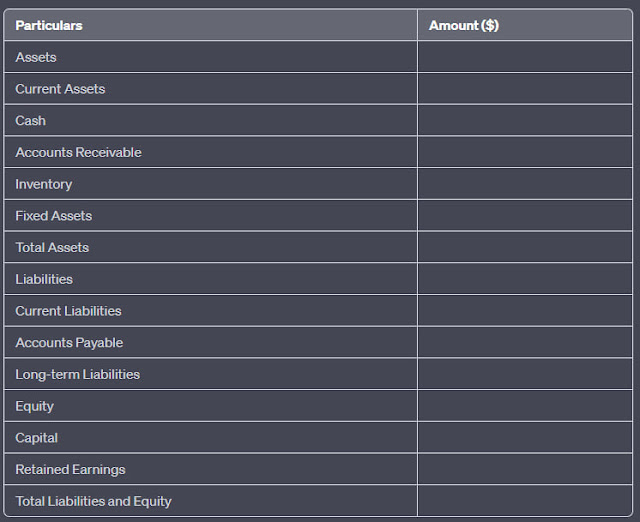Learn the Basics of Accounting: Concepts, Golden Rules, Ledger Accounts, and Final Accounts
Accounting serves as the language of business, enabling organizations to record, analyze, and communicate financial information. In this article, we will explore the fundamentals of accounting, including the golden rules of accounting, ledger accounts, and final accounts. Through explanations, examples, and proforma templates, we aim to provide a comprehensive understanding of these essential accounting concepts.
1. Accounting: A Brief Overview
Accounting involves the systematic recording, summarizing, analyzing, and reporting of financial transactions and events. It provides insights into a company's financial health, performance, and sustainability.
2. Golden Rules of Accounting:
a. Personal Accounts: "Debit the receiver, credit the giver." When a transaction involves individuals or entities, the receiver is debited, and the giver is credited. For example, if you receive $500 from a customer, you debit your accounts receivable (receiver) and credit cash (giver).
b. Real Accounts: "Debit what comes in, credit what goes out." When a transaction involves tangible assets, the account is debited for incoming resources and credited for outgoing resources. For instance, if you purchase equipment worth $1,000, you debit equipment (what comes in) and credit cash (what goes out).
c. Nominal Accounts: "Debit all expenses and losses, credit all incomes and gains." For transactions related to expenses, losses, incomes, or gains, expenses and losses are debited, while incomes and gains are credited. For example, if you incur advertising expenses of $200, you debit advertising expenses (expense) and credit cash (outflow).
Expenses can encompass various categories such as rent, utilities, electricity bills, administration costs, and more. On the other hand, incomes can include sales revenue, services revenue, interest received, dividends received, and other sources of revenue.
When expenses are paid in advance, they are classified as prepaid expenses. Similarly, when revenue is received in advance, it is referred to as deferred revenue. Prepaid expenses and Deferred Revenue are important concepts in accounting. In the case of prepaid expenses, the payment is made first and then recorded in the financial statements at a later stage. Conversely, with deferred revenue, the receipt of revenue occurs first, and the transaction is subsequently recorded in the financial statements.
In any business, buying and selling goods or services is a common practice. Many companies engage in credit purchases or credit sales, wherein the transaction is recorded in the financial statements to reflect the incurred expenses or generated revenue. These types of transactions are known as accruals or accrued concepts. Just like Prepaid and Deferred concepts, the Accrual concept is also important in account also part of month-end activity. Understanding these accounting concepts is essential before commencing work in any company to ensure accurate financial record-keeping and allocation of transactions to the appropriate accounting period.
Please let me know if you have any further questions or if there's anything else I can assist you with!
3. Ledger Account:
A ledger account is a detailed record of transactions related to a specific category, such as an asset, liability, equity, revenue, or expense. It captures the individual debit and credit entries, facilitating the preparation of financial statements.
Example: Let's consider the ledger account for cash. Each transaction involving cash is recorded in this account. Here's a ledger proforma for the cash account:
4. Final Accounts:
Final accounts refer to the preparation of financial statements, including the income statement (or profit and loss statement) and the balance sheet. These statements summarize the financial performance and position of a company during a specific period.
Example Problem:
Let's consider the following information for XYZ Company:
- Sales revenue: $50,000
- Cost of goods sold: $30,000
- Operating expenses: $10,000
- Non-operating income: $5,000
- Non-operating expenses: $2,000
- Tax rate: 20%
Income Statement (Revenue and Expense Accounts):
5. Learning Resources:
To enhance your accounting skills, numerous free resources are available online. Some recommended platforms include:
- YouTube channels: "Accounting Basics" by AccountingCoach, "Edspira" by Edspira, "FreeAccountingSchool" by FreeAccountingSchool.
- Online blogs and websites: AccountingCoach.com, Investopedia.com, WallStreetMojo.com.
In conclusion, understanding the basics of accounting, including the golden rules, ledger accounts, and final accounts, is essential for aspiring accountants. By mastering these concepts and utilizing free online resources, individuals can embark on a successful accounting career and contribute to the financial success of organizations.
Remember, learning the basics of accounting lays a solid foundation for advanced financial management and analysis. So, dive into the world of accounting and unlock endless opportunities for growth and success.



No comments:
Post a Comment